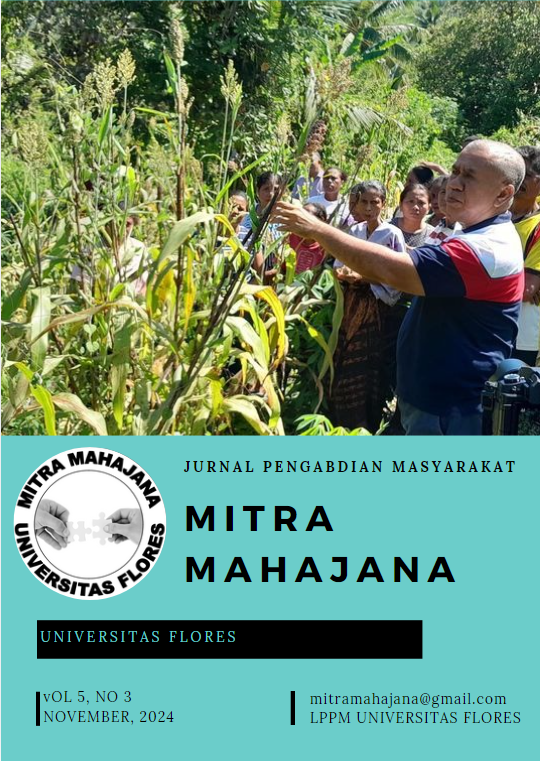IN HOUSE TRAINING PEMBELAJARAN STEM BERBASIS ENGINEERING DESIGN PROCESS KEPADA GURU SMK DARUL MUQOMAH KABUPATEN JEMBER
DOI:
https://doi.org/10.37478/mahajana.v5i3.4591Abstract
In the era of the Industrial Revolution 4.0, people are required to have skills, knowledge, and abilities in various fields. Therefore, integrating 21st-century skills into the learning process is very important. Learning should emphasise critical thinking, creativity and innovation, collaboration, and communication. One method that can be used to enhance 21st-century skills is STEM learning based on the engineering design process. This community service activity was carried out over three months and was divided into four phases: the preparation phase, the planning phase, the implementation phase, and the evaluation phase. The results of the activity show that the majority of teachers at SMK Darul Muqomah have a good understanding of STEM learning based on the engineering design process. Overall, this training has been well executed. The participants stated that the training was beneficial and could expand their understanding of STEM learning based on the engineering design process. Specifically, this training provided an overview of the application of the STEM approach in school learning. All participants showed interest and willingness to implement STEM learning in their classes. However, it is important to note the challenges or obstacles in implementing the STEM approach in the classroom.
Downloads
Keywords:
in house training, STEM learning, engineering design processReferences
Khoiriyah, N. (2018). Implementasi pendekatan pembelajaran STEM untuk meningkatkan kemampuan berpikir kritis siswa SMA pada materi gelombang bunyi. Jurnal Riset dan Kajian Pendidikan Fisika, 5(2), 53 – 62. DOI: https://doi.org/10.12928/jrkpf.v5i2.9977
Maulana, M. (2020). Penerapan model project based learning berbasis STEM pada pembelajaran fisika siapkan kemandirian belajar peserta didik. Jurnal Teknodik, (2), 39–50. DOI: https://doi.org/10.32550/teknodik.v0i2.678
Nuryani, H. S. (2021). Pembelajaran Berbasis Stem (Science Engineering Mathematics And Science) Untuk Meningkatkan Kemampuan Teknik Siswa. Pendas: Jurnal Ilmiah Pendidikan Dasar, 6(2), 232–243. DOI: https://doi.org/10.23969/jp.v6i2.5027
Nusyirwan, D. (2018). Pemanfaatan Low Resolution Prototipe (LRP) pada Engineering Design Process (EDP) di Jurusan Teknik Elektro Universitas Maritim Raja Ali Haji (UMRAH). Jurnal Sustainable: Jurnal Hasil Penelitian Dan Industri Terapan, 7(1), 24–31. DOI: https://doi.org/10.31629/sustainable.v7i1.444
Partono, P., Wardhani, H. N., Setyowati, N. I., Tsalitsa, A., & Putri, S. N. (2021). Strategi meningkatkan kompetensi 4C (critical thinking, creativity, communication, & collaborative). Jurnal Penelitian Ilmu Pendidikan, 14(1), 41–52. DOI: https://doi.org/10.21831/jpipfip.v14i1.35810
Purwanti, P., & Zulkarnaen, Z. (2023). Media pembelajaran berbahan loose part berbasis STEAM dapat membangun merdeka belajar pada anak usia dini. Pedagogi: Jurnal Ilmu Pendidikan, 23(1), 38–47. DOI: https://doi.org/10.24036/pedagogi.v23i1.1469
Ridha, M. R., Zuhdi, M., & Ayub, S. (2022). Pengembangan perangkat pembelajaran PjBL berbasis STEM dalam meningkatkan kreativitas fisika peserta didik. Jurnal Ilmiah Profesi Pendidikan, 7(1), 223–228. DOI: https://doi.org/10.29303/jipp.v7i1.447
Saputri, M., & Syukri, M. (2022). Analysis of momentum and impulse on students’ creative thinking skill through project based learning integrated STEM (science, technology, engineering, mathematics). Journal of Physics: Conference Series, 2193(1), 012066. DOI: https://doi.org/10.1088/1742-6596/2193/1/012066
Sasmita, P. R., & Hartoyo, Z. (2020). Pengaruh pendekatan pembelajaran STEM Project Based Learning terhadap pemahaman konsep fisika siswa. Silampari Jurnal Pendidikan Ilmu Fisika, 2(2), 136–148. DOI: https://doi.org/10.31540/sjpif.v2i2.1081
Tipmontiane, K., & Williams, P. J. (2022). The integration of the engineering design process in biology-related STEM activity: A review of Thai secondary education. ASEAN Journal of Science and Engineering Education, 2(1), 1–10. DOI: https://doi.org/10.17509/ajsee.v2i1.35097
Yuanita, Y., & Kurnia, F. (2019). Pengembangan bahan ajar berbasis stem (science, technology, engineering, and mathematics) materi kelistrikan untuk sekolah dasar. Profesi Pendidikan Dasar, 6(2), 199–210. DOI: https://doi.org/10.23917/ppd.v1i2.9046
Yusuf, I., & Asrifan, A. (2020). Peningkatan Aktivitas Kolaborasi Pembelajaran Fisika Melalui Pendekatan Stem Dengan Purwarupa Pada Siswa Kelas Xi Ipa Sman 5 Yogyakarta: (Improving Collaboration of Physics Learning Activities through the STEM Approach). Uniqbu Journal of Exact Sciences, 1(3), 32–48. DOI: https://doi.org/10.47323/ujes.v1i3.68
Downloads
Published
How to Cite
Issue
Section
License
Copyright (c) 2024 Rif’ati Dina Handayani, Nila Mutia Dewi, Albertus Djoko Lesmono, Bambang Supriadi, Maryani Maryani

This work is licensed under a Creative Commons Attribution-ShareAlike 4.0 International License.
The authors and other parties are bound to the Attribution-ShareAlike 4.0 International license (CC BY-SA 4.0 DEED) for the published articles. This permits users to:
Share — copy and redistribute the material in any medium or format for any purpose, even commercially.
Adapt — remix, transform, and build upon the material for any purpose, even commercially.
The licensor cannot revoke these freedoms as long as you follow the license terms.
Under the following terms:
Attribution — You must give appropriate credit , provide a link to the license, and indicate if changes were made . You may do so in any reasonable manner, but not in any way that suggests the licensor endorses you or your use.
ShareAlike — If you remix, transform, or build upon the material, you must distribute your contributions under the same license as the original.
No additional restrictions — You may not apply legal terms or technological measures that legally restrict others from doing anything the license permits.






